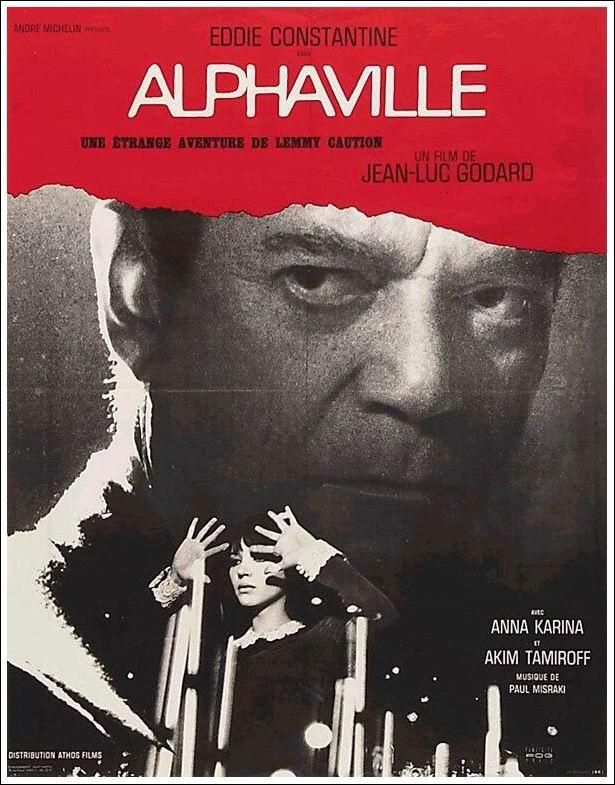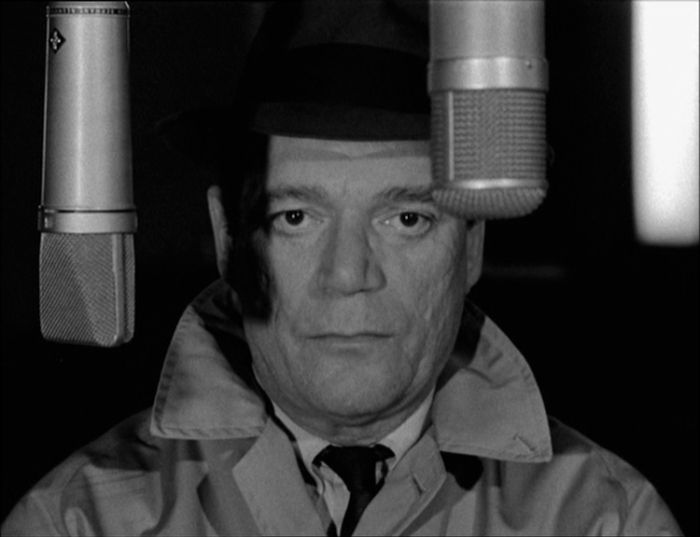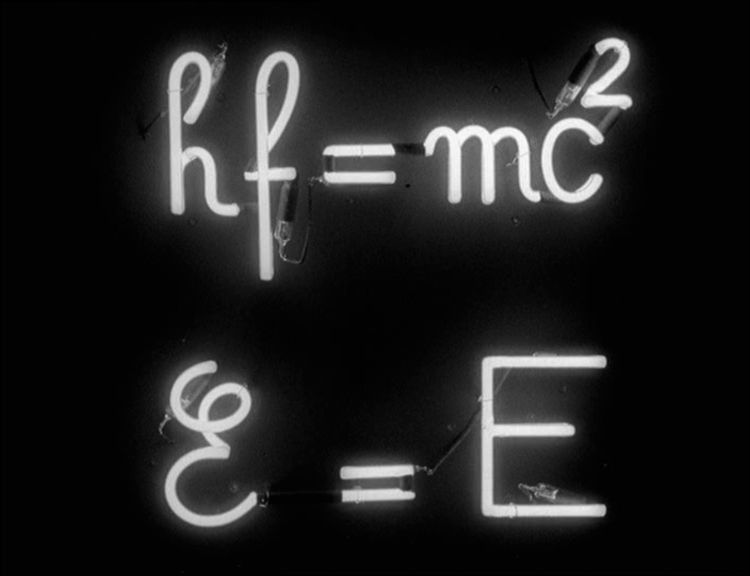Alphaville
1965
Director: Jean-Luc Godard
Starring: Eddie Constantine, Anna
Karina
I
shouldn’t like Alphaville. By my own
admission, I have problems enjoying the films of the French New Wave, and Alphaville
is very French New Wave. And of the
French New Wave directors, my least favorite is Godard, and Alphaville
is very Godard. But there’s something
about the mash-up of science fiction and film noir with Godard’s New Wave style
that, inexplicably, works for me.
Lemmy
Caution (Constantine) is an undercover agent from a region called the
Outlands. Masquerading as a journalist,
he is sent to enemy region Alphaville with the mission to locate scientist
Professor Von Braun and take him back to the Outlands or kill him. Along the way, he encounters Von Braun’s
daughter Natacha (Karina), and through her, he starts to realize the strange
workings of Alphaville. Alphaville is
controlled by a central computer, Alpha 60, that has outlawed free thought,
poetry, and illogical emotions, such as crying after the death of a
spouse. Caution must find a way to take
down Alpha 60 in order to complete his mission and free Natacha.
There
is more than a passing resemblance to 1984 here. The residents of Alphaville are almost
identical to the residents of Oceania, in that they do not think for
themselves, they have automated replies, they no longer feel emotions, they
listen implicitly to what a central being tells them (Alpha 60 in this case),
and they coldly eliminate dissidents.
This resemblance has to be on purpose; there’s even a bit in Alphaville
where Natacha (clearly similar to Julia) talks about not knowing the meaning of
a word that Caution uses because it’s not in “The Bible,” which is really just
a dictionary for the allowed words of Alphaville. Three years ago, my school district put on
the stage version of 1984, and I participated in it. (I played a guard, and I got to beat the crap
out of various students on stage. It was
fun.) I like 1984 quite a bit, I have a
personal connection to it, so the dystopian mind-control aspect of Alphaville
works for me. Already, I’m
predisposed to like Alphaville because of this association.
And
then we have the science fiction aspect.
Considering that Star Trek: The
Next Generation was a fundamental part of my childhood, I also tend to
gravitate towards sci-fi films in general, and Alphaville is one of my
favorite types of sci-fi. Alphaville
is science fiction because of its central conceit and not because of any sets,
costumes, of special effects. There are
no futuristic funny sets, weird far out costumes, and zero special
effects. In fact, the entire film was
shot in real locations in 1960s Paris; Godard chose his sets well, however,
because when told that this is some futuristic dystopian society, I buy
it. I believe it. Sure, some sets look like 1960s Paris (mostly
the hotel lobbies that we see), but most of them work. Particularly disturbing to me are the
interrogation rooms, with the microphones moving back and forth, the bright
flashing lights, and the fan voice of the computer. No, Alphaville is not science-fiction
because of false sets and funny makeup.
Instead, Alphaville is science fiction because people talk about weird
lands we don’t know and intergalactic flight, even though we see none of
it. Alphaville is a land built on the
supreme logic of its central computer Alpha 60, and constant references to
science and computers helps to reinforce the science fiction of it all, but
that’s really all we get. The creepy
computer voice of Alpha 60, voiced by one of those voice-box replacements for
someone who has lost their larynx to throat cancer, is unsettling and
omnipresent. A simple voice-over effect
goes a very long way to help convince me that yes, this is some bizarre future
world.
Then
there’s the New Wave style of the film.
Many of the classic styles of Godard are on display here, most notably
the random cuts to show signs and words.
I’ve seen Godard do this in many of his other films, and then, it’s just
been some sort of obnoxious reminder that he’s experimenting with film
style. Here, though, the words he cuts
to are neon signs, and often the signs are the equations E=mc2 or
E=hf (the latter I use extensively in my unit on the physics of chemistry). There’s something about seeing these neon
signs intermittently through the narrative that helps the film. To me, it reinforces that this is a
futuristic city. I read these random
cuts not as Godard’s directorial choice, but instead as Alpha 60 implanting the
images in the heads of the population of Alphaville. Whenever we get one of these cuts, it reminds
me that these citizens are brainwashed, and maybe this is what Alpha 60 is
using to do that. Similarly, at the end
of the film, when Alpha 60 starts to break down, Godard plays with the negative
exposure of the black and white film.
Again, I read this as an effect on Alphaville because Alpha 60 is
malfunctioning. In short, all the weird
New Wave techniques that Godard uses here work for me because they fall within
the context of the science fiction setting of the film.
The
score of the film is also effective.
It’s essentially one piece aimed at ramping up tension. It’s absolutely classic film noir mood
music. The score, more than anything
else, is what makes Alphaville film noir for me, with that hefty dose of sci-fi
thrown in. Caution’s wardrobe (classic
trenchcoat, hat, and gun) and attitude are entirely taken from the American
film noir of the forties and they certainly contribute to the film noir, but
the music, for me, is what really cements the noir in Alphaville.
Despite
all of this, I do have some problems with Alphaville. It doesn’t entirely work. The biggest fault, my biggest problem with Alphaville,
is how long Godard takes to explain what’s going on with the people in
Alphaville. We don’t get the explanation
that Alpha 60 is controlling the minds of the populace, that emotion has been
outlawed, until at least halfway through the film, and we don’t get a complete
and thorough understanding until two-thirds through. I think this would be an even stronger film
if we, as an audience, understand what’s up with Alphaville in the
beginning. It would take away a great
deal of the random confusion at the beginning of the film. As an undercover agent, you would think that
Lemmy Caution would do his homework and understand the culture he’s walking
into when he goes to Alphaville.
Apparently, Caution likes to walk into a foreign land knowing nothing
about it.
Alphaville, more than anything, serves as
a reminder to me to never write off a director or a genre simply because I
dislike most of their films. There will
always be one or two films that buck the trend.
This is probably my favorite Godard film, and Godard typically annoys
me. Alphaville shouldn’t work for
me. I shouldn’t like Alphaville. But I do.
It’s weird, it’s random, it’s more than a little bizarre, but I like
it. The tone works for me.
Arbitrary
Rating: 8/10



This is one I feel like I should watch again. It was the first Godard film I ever saw, and now that I've seen a half dozen or so, I think I might approach this one very differently.
ReplyDeleteY'know, this one goes against the grain a bit in terms of Godard not being as obnoxiously Godard as he is in nearly every other film of his on the list.
DeleteGood review, but unfortunately this film didn't work for me. I agree that it's science fiction; I just don't agree that it's good science fiction. In fact, I'm still confused on whether it is supposed to be a parody or not. I found myself laughing many times (Caution seeming to shoot anyone who gets close to him, the burping computer, driving a car home when they are supposed to be on another planet, etc.)
ReplyDeleteY'know, I can totally see this film not working for someone. I can understand you reading the film that way. But, as I say, this one, rather inexplicably, works for me. So... yeah. I won't really defend this film, just say that, all things considered, I liked it. A good deal. Is it the best film ever? Heavens no. It has problems, sure.
Delete